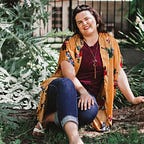Top 5: Intersectionality Round-Up for Nov. 2020
When I’m interested in something, I create a Google alert so I can get updates on what’s being published, talked about, and otherwise disseminated across the interwebs. Here’s a look at a few of the resources that have come my way of late. Intersectionality has been connected to faith & racial justice, blackness & philanthropy, the climate movement, the harm of the patriarchy, and allyship & gender inequity for medical residency students.
By sharing this round-up I’m not endorsing every viewpoint, author, and/or statement. I’m seeking to share how intersectionality is being used in the mainstream to dissect all sorts of different relationships, structures, and ways of understanding the world!
[Image Description: The folded spines of a large stack of newspapers.]
HGI and CMSA hold Faith and Racial Justice Panel to Discuss Intersectionality
After the readings, senior Ireland Twiggs and graduate student Naouras Almatar moderated the discussion and prompted questions for the panelists. After each panelist described their experience with faith and religion, Almatar posed the question, “How does your ethnicity change your experience from other ethnicities that practice in your religion, and have you ever experienced racism from [these religions]?”
Anti-Blackness Is Global and Gendered — Philanthropy’s Response Must Be, Too
The silos of racial justice, gender justice, and safety collided in the activism around Breonna’s death and that of so many other black women, and yet philanthropy is ill-equipped to activate resources across these interconnected issues. While some foundations have pledged to give more, philanthropy must go further to dismantle the issue silos that have kept us from actively championing the Black women, girls, and transgender, nonbinary, and gender-nonconforming people who are not only leading the latest resounding call for racial justice, but who are the lifeblood of so many movements for social change around the world.
Q&A With Lauren Ritchie on Intersectionality in the Climate Movement
In the Q&A below, Ritchie discusses her motivations for creating The Eco Gal and the Columbia Climate Conversations, the changing role of environmental and social justice within the climate movement, and how to advance intersectionality within and outside of the classroom.
On International Men’s Day, Let’s Talk About How Patriarchy Harms Men
It is true that women have been disadvantaged by patriarchy and misogyny for centuries. It is an inequality that still exists today and one that pervades our everyday lives. However, anyone who believes in the intersectionality of feminism would agree that women are not the only ones who bear the brunt of patriarchy. Other genders and even heterosexual and cisgender men who are on top of the pyramid of privilege, are disadvantaged from it.
As a feminist, I believe that everyone deserves equal rights, not because they identify as men or women, but because they are human beings who deserve to be treated right. So today, let’s talk about how much patriarchy hurts men too.
Allyship and Gender Inequity: What Medical Residents Need to Know
The WILD curriculum includes physicians across the gender spectrum, allowing for allies to gain tools needed to address gender inequity and physicians who are affected by gender inequity to share their perspective with potential allies. One key takeaway from those conversations for potential allies: One size does not fit all.
